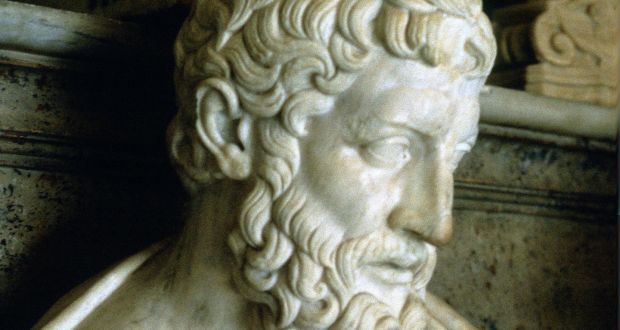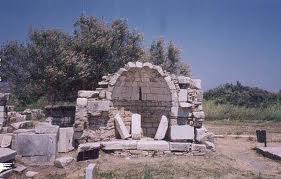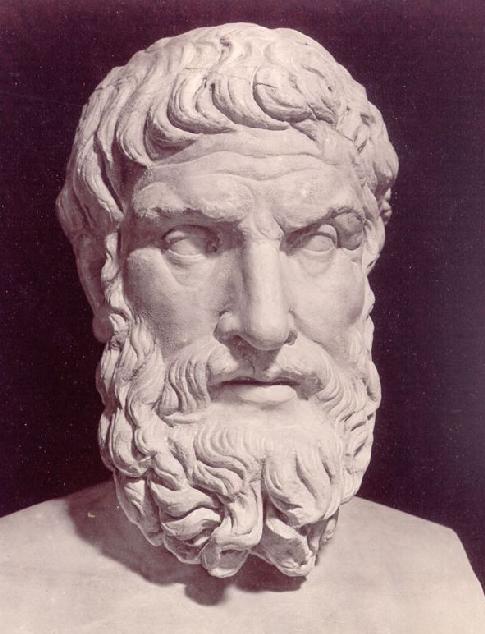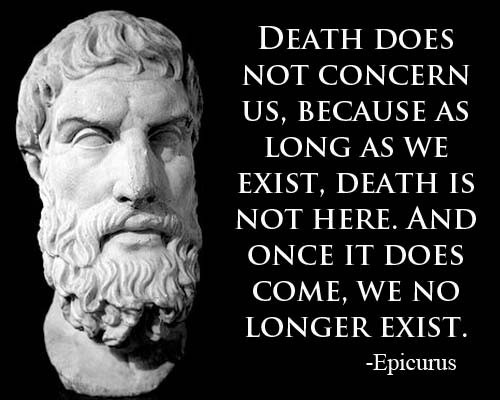Early philosophy in ancient Greece sought to explain the nature of the universe. For instance, there was Thales of Miletus, who held the rather bold belief that the entire universe is made of water in one form or the other. This dramatic delve into the study of metaphysics was very popular with early philosophers and was inevitably built upon and reproduced in various forms.
By the time Epicurus was born in 341 BCE on the Aegean island of Samos, popular philosophy was shifting emphasis from metaphysics (determining the nature of the universe) to personal ethics. It was a change that was prompted by Socrates some hundred years beforehand. Socrates, through his teachings and lectures, forced individuals to examine basic human values and ethics.
And because of this, people began asking themselves some very profound and fundamental questions. What does it mean to be moral? What is the true nature of human ethics? How should one live their life?
Epicurus sought to answer these questions. His teachings would gain attention for their dramatic departure from commonly held religious beliefs. He was determined to help others comprehend the true purpose of life and come closer to understanding the nature of death.
EMPIRICAL WISDOM AND THE TRUE NATURE OF THE GODS
Epicurus was taught philosophy as a boy by a disciple of Plato on the island of Samos. As a man, he diligently studied the teachings of the atomist philosophers Democritus and Leucippus. Epicurus would eventually adopt the view that the entire universe is composed only of atoms and empty space, which is a line of thought that we are more accustomed to.
Epicurus believed that the universe was logical and behaved with predictable tendencies. Because of this, he was a strong proponent of finding true knowledge through observable, objectively verifiable phenomenon. In this regard his thinking was very similar to the modern scientific method. His beliefs ran counter to the commonly held idea that knowledge can be found through mythology and religion.
This stance was not one that was accepted by much of ancient Greece. It would appear that Epicurus was denying the existence of the gods in favor for a reliance on scientific thought. And indeed, Epicurus is said to have stated, “It is folly for a man to pray to the gods for that which he has the power to attain by himself”.
Needless to say, this made him rather unpopular.
Keeping in line with his belief that the gods did not determine the course of one’s life, he was also a strong proponent of the idea of free will. To Epicurus, each human was the captain of his or her own ship. You may choose to be virtuous or you may choose to be evil. It is your decision.
But if we are the author of our own stories, then that might seem to put a lot of pressure on an individual. If I am the sole force determining the course of my life, then how should I best lead my life?! Epicurus had an answer for this as well.
HOW TO LEAD YOUR LIFE
What is the goal of life? To Epicurus the goal of living was to find happiness through friendship, living humbly and avoiding pain and anxiety. He believed very strongly that by living peacefully and avoiding fear and pain, we could live fully. To Epicurus, living a virtuous life and a peaceful life were one in the same. This is seen when he states…
“It is impossible to live a pleasant life without living wisely, honorably, and justly, and it is impossible to live wisely, honorably and justly without living pleasantly.”
A common, and incorrect, assumption of Epicurus was that he promoted finding happiness through material wealth and superficial excess.
Epicurus preached quite the opposite. He believed that the rich man was not the man who has the most, but rather the man who needs the least. He advised us, “Do not spoil what you have by desiring what you have not; remember that what you have now was once among the things you only hoped for.”
According to Epicurus, we should all seek a life of knowledge and temperance, surrounded by friends and free from fear and pain. And to Epicurus, there was one obstacle that plagued the hearts of men; it was this one thing that kept us from living a happy and fulfilled life.
DEATH IS NOTHING TO US
Epicurus believed that finding a life of peaceful contentment devoid of pain or fear should be the goal of every life. Epicurus believed that the one thing that was holding people back from truly accomplishing this feat was the fear of death.
The inhabitants of ancient Greece lived in constant fear of the wrath of the Gods. They viewed their mortal life as a temporary condition. Their sins and wrongdoings would be judged harshly by temperamental, vengeful gods. The expectation of pain and torment for eternity at the hands of Thanatos, the terrifying personification of death, was commonplace in ancient Greece.
Epicurus believed that the main obstacle to a fulfilled life was the irrational fear of incurring the wrath of the gods and suffering for eternity in the lair of Hades. We are so preoccupied with fearing death that we refuse to acknowledge life.
Epicurus sought to remedy this. And he did so by explaining the nature of death.
To Epicurus, the entire world was constructed entirely of atoms and empty space. Epicurus reasoned that the human soul could not be constructed of empty space. The consciousness (the soul) interacted very closely, very dynamically with the body. This would mean that the soul was made of atoms, presumably dispersed throughout the body. However these atoms would be fragile. Epicurus taught that at the time of our death, the soul would evaporate entirely.
Death marks the end of consciousness and sensation. This would mean that we would be unable to feel any emotional or physical pain. If we are no longer capable of feeling fear or pain when we decease, then it is foolish to be preoccupied with the notion of death. Epicurus believed that this fear was an obstacle to true happiness in this lifetime. If we could accept death, not ignore it or mystify it, but truly accept it as the end of being, then we could find happiness in this life.
“Death does not concern us, because as long as we exist, death is not here. And once it does come, we no longer exist.”
Epicurus was viewed as dismissive of religion and therefore disliked by much of Greece. He did however gain a small but very loyal following. He founded a school of philosophy in Athens named “The Garden”, after a garden he enjoyed as a child on the island of Samos.
A stone’s throw from Plato’s Academy, The Garden was one of the first philosophical establishments that welcomed both women and slaves.
Epicureanism, the name for the teachings of Epicurus, would be revisited by contemporary ethical philosophers like John Stuart Mill and Jeremy Bentham. The teachings of Epicurus can be heard resounding from the United States’ Declaration of Independence: “life, liberty and the pursuit of happiness.”
Epicurus lived his life free from a fear of death. He tried to teach others to pursue similar goals. He was a man who knew that he was the master of his own life, the sole captain of his ship. He inspired others to pursue scientific knowledge and to live freely.
True to his teachings, Epicurus described the last day of his life in 270 BCE as ‘a truly happy day.’
—-
“Epicurus: The Nature of Death and the Purpose of Life” was written by Van Bryan














8 comments
Great Job! I am very impressed…He apperantly was very brillaint man, before his time
Honestly an incredibly well written and mind altering article, I especially like its relation to fraternity life in today’s time.
I really enjoyed this essay.
I really quite am the fan of Epicurus. :) Very well written article, and great philosopher.
I like Epicurus, but find it hard to accept that human failings can be traced to a single fear, ie, of death. People fear a great many things short of death, and these fears seem often to have more of an immediate effect on behavior. I think of the fear of embarrassment, fear for the life and health of a loved one, fear of rejection, etc. Is it possible these did not exist in Epicurus’s time? If not, why did he apparently not address them?
Epicurus’ notion does make sense to me,but honestly I don’t believe that one’s soul evaporates when death comes.Instead,u get to live in an unconcious world.
Ron wrote:
“I like Epicurus, but find it hard to accept that human failings can be traced to a single fear, ie, of death.”
Epicurus is not the only observer to connect other fears, such as fear of embarrassment or ostracism to the fear of death. The idea is that somehow unconsciously we connect these phenomena to death, or at least “ego-death”.
When confronted with them, it is as if our life, or our life as we have known it, is threatened. So, if we were not afraid of death, presumably we would not be afraid of these things either. I don’t know if I agree, but that is sort of the theory.
Epicuriosity killed the cat, that wasn’t afraid to die…..
Trackbacks
Our apologies, you must be logged in to post a comment.